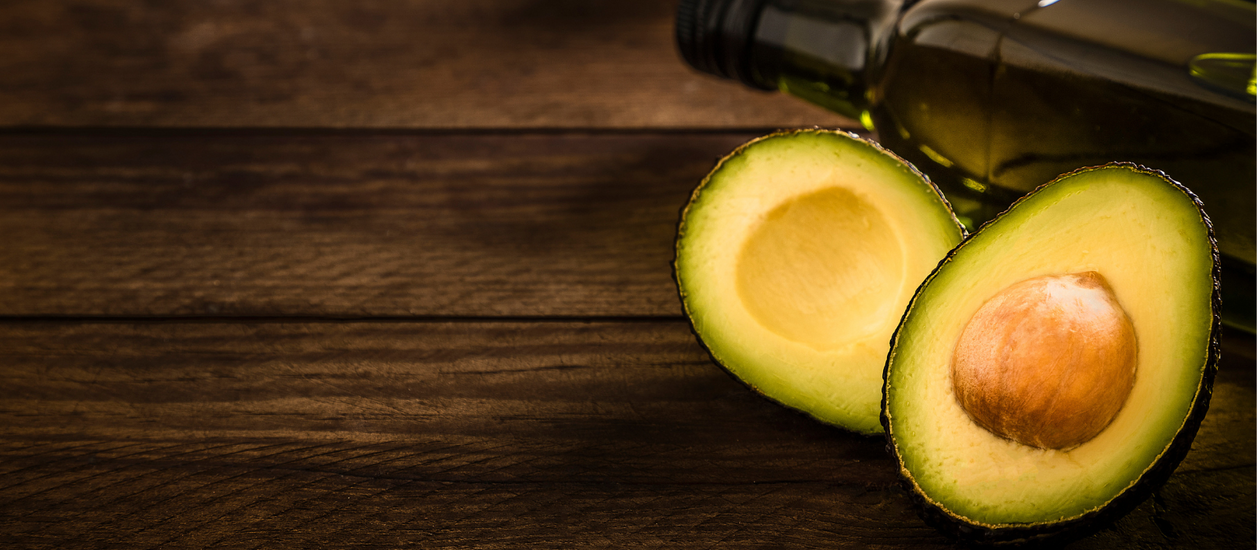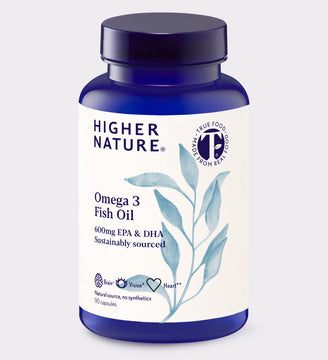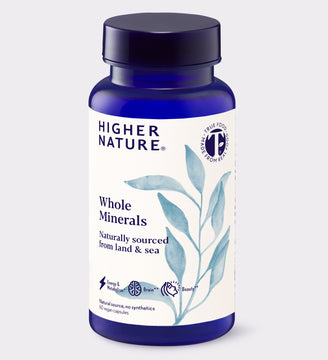
High cholesterol
Elizabeth Houston - Higher Nature Nutritional Therapist - Dip BCNH mbant mCNHC
High cholesterol is a common health issue. According to Public Health England 60% of adults in England have high cholesterol. The link between high levels of LDL cholesterol and the incidence of cardiovascular disease is well established.
Anyone can have high cholesterol. The are several causes of high cholesterol including genetic- about one in 250 people has familial hypercholesterolaemia (FH), this is an inherited condition that means their cholesterol levels are higher than normal. Men are also more likely to have high cholesterol and those from from South Asian background. You are also more likely to have high cholesterol if you have certain health conditions such as an underactive thyroid gland, type 2 diabetes, liver disease or kidney disease.
However there are many diet and lifestyle causes too, including a diet high in saturated fats, high alcohol and smoking. Even if your genetics are the underlying cause of your high cholesterol, making diet and lifestyle changes can help reduce your levels and therefore your chances of the associated health issues.
What exactly is cholesterol? Cholesterol is a type of fat, also known as a lipid, found in the body. Despite its bad press, the body needs cholesterol for several vital functions. It is only when cholesterol is found in excess in the body that it can begin to cause health problems.
Cholesterol is required for:
- Cell membrane structure. Cholesterol is an important structural component within cells.
- The synthesis of steroid hormones such as oestrogen and vitamin D.
- The production of bile acids to aid both digestion and the absorption of fats.
Types of cholesterol:
- High-density lipoprotein (HDL) (often referred to as Good)
High-density lipoprotein is typically referred to as the ‘good’ type of cholesterol. This is because it helps remove excess (bad) cholesterol from your blood vessels. It manages to do this by transporting cholesterol to your liver from your tissues. Your liver then takes the cholesterol and breaks it down, which enables it to be removed from your body.
- Low-density lipoprotein (LDL) (often referred to as bad)
Low-density lipoprotein transports cholesterol around your body from your liver to wherever it’s needed in the body. If your LDL levels are too high, it can produce fatty deposits in your arteries. It’s important to note that the health of your arteries is a factor here, if they are damaged from inflammation (smoking is a common risk factor) cholesterol will be more likely to attach to the inflamed area making deposits more likely. This can increase the risk of stroke and heart disease. This is why LDL is often referred to as ‘bad’ cholesterol.
- Triglycerides
This is not cholesterol but often tested at the same time by doctors. Triglycerides are blood fats, eating high levels of saturated and trans fats can cause high blood triglycerides and are used as an indication of a higher risk of cardiovascular disease. Triglycerides maintain the transportation and storage of energy.
If you are worried about high cholesterol your GP will give you a simple blood or finger prick test. You may just be told your total cholesterol which should be below 5 however you may have your result broken down as follows:
|
Total cholesterol
|
Healthy range Below 5
|
|
Non-HDL or ‘bad’ cholesterol
|
Below 4
|
|
LDL cholesterol
|
Below 3
|
|
HDL or ‘good’ cholesterol
|
Above 1 for men and 1.2 for women
|
|
TC:HDL ratio
|
The lower the better – above 6 is considered a high risk
|
|
Triglycerides
|
Below 2.3 (non-fasting)
|
So what can we do about it?
High cholesterol can be greatly improved by changes in diet and lifestyle, and nutritional supplements.
Red yeast rice is a product of rice fermentation. You may see Red yeast rice in herbal remedies. Red yeast rice contains chemicals similar to those in the anti-cholesterol drug statins.
Plant sterols found in plants such as vegetables, nuts, beans and lentils, contribute to the maintenance of normal blood cholesterol levels as they are thought to decrease the absorption of bad cholesterol from the intestines.
Please note whilst taking plant sterols it is also recommend that you take the antioxidant Coenzyme Q10. Levels of this antioxidant can fall when taking this supplement due to it being transported in LDL cholesterol. Coenzyme Q10 is also recommended alongside cholesterol lowering drugs.
While both soluble and insoluble fibre are helpful, soluble fibre seems to be key in cholesterol management. It is believed that this type of fibre binds to cholesterol particles in the digestive system, flushing them out of the body before they have a chance to be absorbed.
Have plenty of soluble fibre through foods like black beans, oat bran, avocadoes, and broccoli.
There is a lot of mixed information on certain foods such as eggs and prawns and their effect on cholesterol. These foods contain cholesterol, we used to believe that foods containing high cholesterol levels had a direct effect on our blood cholesterol level. We now understand that the cholesterol in food has little impact so the advice to avoid them has been reversed. Food high in saturated fat such as red meat, butter and cheese however has been shown to increase LDL cholesterol and should be limited. Replacing saturated fats with mono or polyunsaturated fats such as olive oil, avocado and nut and seed oils has been shown to reduce blood cholesterol levels.
Food to increase:
• Whole grains: Oats, barley, whole wheat bread, whole-wheat pasta, brown rice, quinoa,
• High-fibre, antioxidant-rich fruits: Berries, citrus fruits, bananas, apples, pears, peaches, and melon.
• Fatty fish: Salmon, tuna, herring, mackerel, and anchovies. Omega 3 fish oil is high in in EPA and DHA contributes to the normal blood triglyceride levels.
• Lean protein: Chicken, turkey, beans, nuts, lentils, tofu, tempeh, and edamame.
• Antioxidant, anti-inflammatory herbs and spices: Ginger, garlic, turmeric, and basil.
Foods to decrease:
• Fried foods: French fries, onion rings, fried chicken, potato chips.
• Processed meals and snacks: Boxed meal mixes, fast food, hot dogs, cookies, bakery products, fruit snacks, and sweets.
• Refined grains: White bread, white pasta, white rice, and white flour in baking.
• Sweetened beverages: Juice, fizzy or energy drinks, and excessive amounts of alcohol.
Sample meal plan for high cholesterol
Day 1
Breakfast: 2 slices whole-wheat toast topped with 1/2 a mashed avocado, sprinkled with salt and pepper
Lunch: Tuna salad wrap: 3 oz. tuna, 1 tablespoon mayonnaise a table spoon of sweetcorn, 1/2 cup chopped tomatoes, in a whole wheat tortilla, 2 cups fresh spinach leaves, 1/4 cup grated carrots, 1 tablespoon olive oil
Snack:
Dinner: Tofu stir-fry with ½ tin bean sprouts, 3-4 mushrooms, 1 red pepper and a handful of brown rice.
Dessert: fruit of choice
Day 2
Breakfast: Oats cooked with soya milk with a handful of berries and 5 brazil nuts
Lunch: 1 boiled egg with 1 slice of seeded bread, mixed green leaves a little olive oil and 1 tomato.
Snack: 1 apple and 1 oatcake with little cottage cheese
Dinner: Chickpea curry made with 1 tin of chopped tomatoes, ½ a tin of chickpeas per person, cooked with curry powder extra turmeric powder 1 clove of crushed garlic served with broccoli and baby sweet corn.
Dessert: 1 yoghurt with a table spoon of flax seeds and blueberries
Day 3
Breakfast: 1 scrambled egg with a cupful of cooked kale and a slice of seeded bread.
Lunch: 1 grilled salmon with a splash of soy sauce, crushed garlic and ginger, green beans, 1 cup of quinoa and olive oil.
Snack: few mixed nuts and raisins
Dinner: Small jacket potato with cottage cheese, baked beans and mixed salad.
Dessert: Small piece of dark chocolate


















